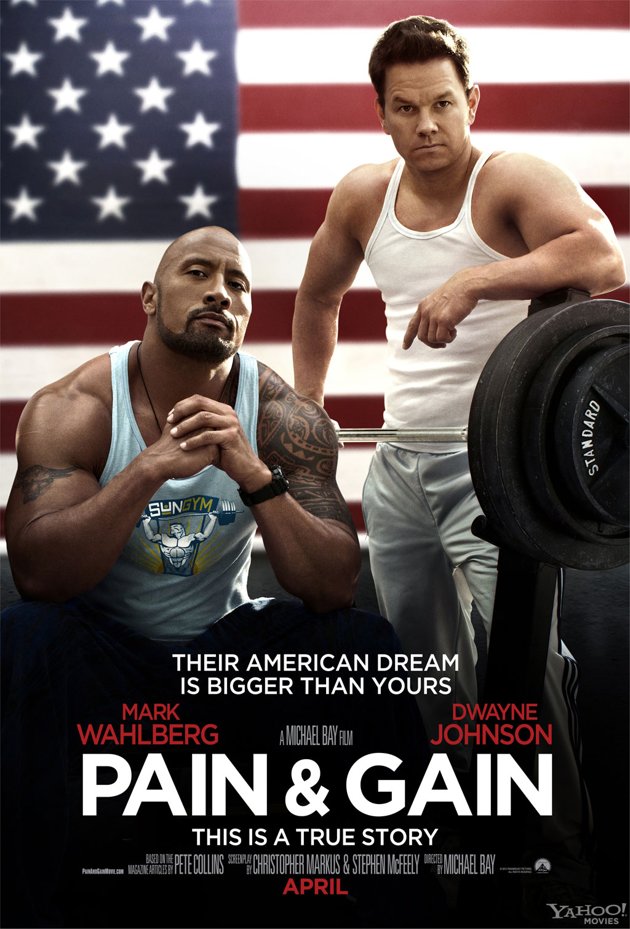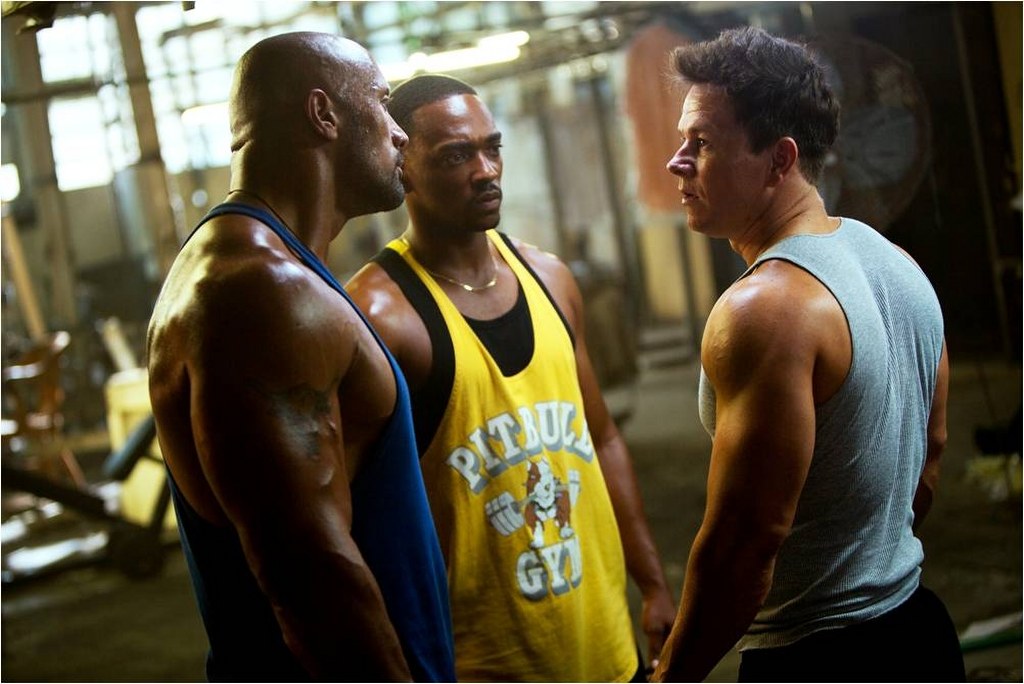Michael Bay goes indie on us. Does he finally realize what a screenplay is in the process?
Genre: Action/Comedy/Crime
Premise: Based on a true story, a fitness trainer kidnaps one of his rich clients, eventually taking over his life. He must then fend off the man’s attempts to claim his life back.
About: This is Michael Bay’s version of an indie film – something he’s talked about doing for over a decade. It stars Mark Wahlberg and The Rock and comes out April 26th. Bay and Wahlberg got along so well during filming, Bay convinced Marky Mark (the busiest actor in Hollywood) to be in the next Transformers movie. P&G is written by big-budget scribes Christopher Markus and Stephen McFeely, who scripted the three Narnia screenplays, the first Captain America script, and are doing the next Thor and Captain America scripts respectively. However, because it’s Bay’s baby, and he was shepherding pretty much the whole writing process, I’ll be looking at this, basically, as his script.
Writers: Christopher Markus & Stephen McFeely (revisions by Jerry Stahl) (Current Revisions by Christopher Markus & Stephen McFeely)
Details: 116 pages – 1/21/11 draft
Awhile back, I heard that Michael Bay wanted to make a “smaller” more “personal” movie. Which was a little surprising. I mean this is a guy who was infamously quoted as saying, “I make movies so I can buy Ferraris” (which I can confirm is 100% true – I saw him out in one of these Ferraris once!). But you figure even the master of the ‘splosion would get tired of his 10,000th Transformer movie, even if they were paying him upwards of 100 million for each one.
So what does a “personal” Michael Bay film look like? Hmmm, well…you aren’t going to be getting Upstream Color 2, if that’s what you’re hoping for. If Bay can’t have big explosions, he’s going to have big somethings. And in this case it’s the big bulky frames of Mark Wahlberg and The Rock! You’re also going to have big soundtracks, like the irresistibly funky Top 40 hit, Thrift Shop! I guess we shouldn’t be surprised, then, that Bay’s smaller personal films are still basically big snazzy films, dressed down slightly.
Where Bay has always faltered in his movies, though, has been the script. He just doesn’t give a shit about it. Either that or he doesn’t understand storytelling. That’s what keeps him from the heights of guys like JJ Abrams, Peter Jackson and James Cameron. True, the Transformers movies have made a ton of money, but they’ve come at the cost of respect. Audiences just don’t take Bay seriously because his stories are a mish-mash of clichés, huge leaps of logic, and good old fashioned bad writing. They are the epitome of style over substance. One would think, then, that if he was telling a smaller story without all the pressures 250 million benjamins brings, that he’d like to get a little more into the story, a little more into the characters. Well, let’s jump in and see if that’s true.
The year is 1995. The town is Miami. The man is Daniel Lugo. Daniel Lugo believes in America. He believes in the notion that hard work pays off. And he’s chosen to do his hard work in the fitness sector, a place where he can milk his charm to make others believe that if they work hard enough, they can look just as big and strong and buff as him.
But Daniel also realizes that there’s a ceiling to what he does. There wasn’t any reality TV back in 1995, so you couldn’t turn your fitness charm into a Bravo show just yet. You worked your butt off 12 hours a day and you earned 50-60 Gs max. Daniel believes that America rewards you for your time. But that reward wasn’t big enough in his opinion.
So Daniel comes up with a plan. Why not kidnap one of his rich clients, kill him, and take all his stuff? Sure, sounds like fun to me. All he has to do is recruit his Mimbo trainer friend Adrian (The Rock) and a former drug addict named Paul Doyle (desperate to be a part of, well, ANYTHING). The three kidnap one of Daniel’s rich clients, Marc Schiller, a slimy piece of work who made his fortune fucking over all kinds of people, then try to kill him.
But the killing doesn’t go as planned and Schiller survives. Here’s the catch though. Schiller’s scared to provoke Daniel because Daniel knows about all his secret illegal doings. If he goes to the police, the police will just find out about all his criminal activity. Daniel figures this out and just moves into Schiller’s place and starts living his life. I mean, what’s to stop him? Eventually Schiller gets fed up, though, and hires a private investigator to collect evidence on Daniel’s shady doings so he can take him down in court. Daniel will probably survive the investigation if he lays low, but when he’s presented with an opportunity to take another high-flying businessman down, he lets greed get the best of him. And that’s when things really start spinning out of control.
Oh boy.
Okay, I want you to imagine Fargo………………..directed by Michael Bay.
Are you imagining that movie?
Okay, well, that’s the exact movie you get with Pain and Gain.
A story dependent on its intricately woven plot and characters directed by someone who doesn’t understand plot or characters.
Now I’m of the belief that there’s no single template for a good script, just as there’s no single template for a bad one. However, there are a number of things you can do to sway the odds in or out of your favor. Here you have a main character who’s kidnapping someone so he can steal all his money, after which he’ll kill him. Okay, got it. We’re rooting for a character to kill people for his own selfish interests. That’s typically not going to go over well with audiences.
Now this can sometimes work in a comedy setting IF the character doing the kidnapping is really funny. But that’s not the case here. At most you get a few hollow chuckles out of Daniels’ antics. There’s a mastery of tone required in this situation, tone that bounces back and forth between seriousness and humor, that is so hard to pull off. It’s a tone the Coens have perfected over time. And it’s something so alien to Bay that I’m surprised he chose to do this film in the first place. I mean, is Bay a secret Coen Brothers fan?
Another problem here is that there are only two interesting characters, Daniel Lugo and Marc Schiller. Daniel works because he’s a walking hypocrite. He says he believes in America and working hard, yet he’s constantly looking for the shortest shortcut to the top. Schiller works because he’s over the top and fun. But everyone else here is boring as hell. I mean The Rock’s character (Adrian) has absolutely nothing going on. He just jumps whenever Daniel says jump. Ditto Paul Boyle, whose only twist is a barely-there drug addiction. The reason this matters is because the script presents itself as an exploration of a bunch of wild weird people caught up in a crazy plot. But there were only two wild and weird people worth watching. Everyone else was boring.
Then there were just things that didn’t make sense. Schiller wanted his life back but couldn’t tell the police because he had too much to hide. So he hires a private investigator to put a case together against Daniel stealing his life. But wait a minute…If he’s putting together a case against Daniel, wouldn’t he eventually have to go to the courts to get his stuff back anyway? Doesn’t that put him in the same position he was in from the get-go? Having to go to the cops? Since that didn’t make a whole lot of sense, and since most of the plot rode on the assumption that it did, you just didn’t care much what happened. When you add on top of that the fact that you hated everyone in the movie, both bad guys and “good,” there wasn’t much left for Pain and Gain to offer.
This script was a hot mess!
[ ] what the hell did I just read?
[x] wasn’t for me
[ ] worth the read
[ ] impressive
[ ] genius
What I learned: Instead of using “We see,” try to convey your imagery and action through description. Pain and Gain opens with our main character doing sit-ups on a roof. The description reads like so: “He crunches toward his knees and sees the parking lot. When he lies back down, he sees the sky. – Up, parking lot. Down, sky.” With this description, we can tell what the camera is doing (showing the crunches from Daniel’s POV), without physically saying, “The camera shows…” or “WE SEE the parking lot from his point of view, then the sky as he comes back down.” The reason this is important is because it keeps us inside the story. The second you say “POV” “the camera” or “We see,” you remind the reader that they’re reading a movie. Now I still see professional writers using these terms (especially writer-directors, who like to write specific shots into their scripts), and they’re by no means script-killers. But, preferably, you want to be as invisible as possible about your script being a script. You can’t whisk your reader away if you’re constantly reminding them that they’re reading a screenplay.



